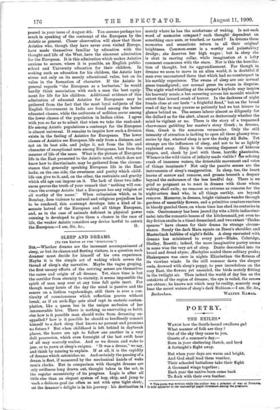SLEEP AND DREAMS.
[TO THE EDITOR OF THE "SrscrATon."] Sra,—Whether dreams are the incessant accompaniment of sleep, or but its chance and fleeting visitors, is a question each dreamer must decide for himself of his own experience. Maybe it is the simple act of waking which severs the thread of sleep's shy narrative. Maybe the vague groping, the first uneasy efforts of the reviving senses are themselves the cause and origin of all dreams. Yet, since time is but the corridor from eternity to eternity, it seems impossible the spirit of man may ever at any time fall quite inert. For though many hours of the day the mind is passive and the senses on a listless vagabondage, still there is ever a con- tinuity of consciousness which reflection proves without break, as if an arch-Ego sate aloof rapt in esoteric contem- plation, like a queen bee in the unique seclusion of her innumerable hive. There is nothing so enervating as habit, else how is it possible man should wake from dreaming un- appalled ? how is it possible he should so heedlessly commit himself to a dark sleep that knows no present and promises no future ? But when childhood is left behind in daybreak places, the hours are apt to follow one another in a very dull procession, which even foresight of the last swift hour of all may scarcely realise. And so we dream and wake to jeer, or to yawn at sleep's enigma. "It was a dream," we say, and think by naming to explain. If at all, it is the rapidity of dreams which astonishes us. And certainly the passing of a dream is fleet, if measured by the mechanical hands of wake men's clocks. But in comparison with thought dreams are only swiftness long drawn out, thought taken in the act, in the regular eccentricity of its progress. Logic is after all little else than an elegant system of hop, skip, and jump to each a dubious goal (as often as not with eyes tight shut); aft the dreamer's delight is in his journey : his destination is merely where he has the misfortune of waking. Is not each word of memories compact ? each thought dependent on something once seen, or touched, or tasted?. In dreams these memories and sensations return in all their original brightness. Common-sense is a worthy and painstaking drudge ; she deserves her high wages ; but in sleep she is shut in snoring cellar, while imagination at a lofty casement communes with the stars. Nor is this the humilia- tion of thought, but its aggrandisement. For though in dreams we seem to move in an alien world, it is doubtful if man ever encountered there that which had no counterpart in his earthly experience. The swans of sleep are our normal geese transfigured ; our normal geese its swans in disguise. The night wind whistling at the sleeper's keyhole may inspire his heavenly music, a bat careering across his moonlit window extort that inward croak of horror. In the darkness of night treads close at our heels "a frightful fiend," but on the broad road of day he may pursue as patiently had we but leisure to glance behind us. The senses labour almost as diligently for the dullard as for the alert, almost as dexterously whether the mind be vigilant or no. There is the story of a trepanned charwoman gabbling her master's stray Greek ; in dreams, then, Greek is the sonorous vernacular. Only the still intensity of attention is lacking to open all these gloomy trea- suries by day, whereof sleep is now the dusky All Baba. Yet strange are the influences of sleep, and not to be so lightly explained away. Sleep is the cunning dispenser of hideous shapes, and, cheek by jowl with these, horrific phantasies. Whence is the wild vision of infinity made visible ? the echoing crash of immense waters, the detestable movement and voice of things ins/'in-late? Not only the passive senses are the instruments of sleep's exaggeration. In sleep, too, the heart learns of sorrow and remorse, and groans beneath a despair beyond the endurance of the less heedful day. There is no grief so poignant as to meat in dreams with those whom waking shall exile ; no remorse so extreme as remorse for the night-arisen dead who, in all things earthly, are beyond remorse. Moreover, in dreams, bright visitants wander through gardens of unearthly flowers, and a primitive creature rearises in bloody gambol there, on whom time has shed its centuries in vain. Oneiromancy has been jeered (by wits a little indiscrimi- nate) into the romantic bosom of the kitchenmaid, yet even to- day fiction exults in a tinsel dreamland, and two extant "Shake- speares " have chosen for their drama its strange circum- stance. Surely the dark Mara squats on Ibsen's shoulder, and Maeterlinck babbles of night's fields. A sleep encrusted with dreams has ministered to every poet—Blake, Coleridge, Shelley, Rosetti ; indeed, the more imaginative poetry seems in some wise the very art of sleep. Dante descended into its broad and dread abyss; JEschylus scaled these solitary peaks; Shakespeare was once in nights Elizabethan the flotsam of its viewless winds. In the still summer dawn the sleeper reels, drowsed with sleep's poppy, to peer incredulous on the rosy East, the flowers yet unsealed, the birds mutely flitting in the twilight air. Then indeed the world of day lies on the outskirts of the region of dreams ; the eye is veiled, the senses are obtuse ; he knows not which may be reality, scarcely may hear the secret waters of sleep's dark Rubicon.—I am, Sir, Sze,


































 Previous page
Previous page